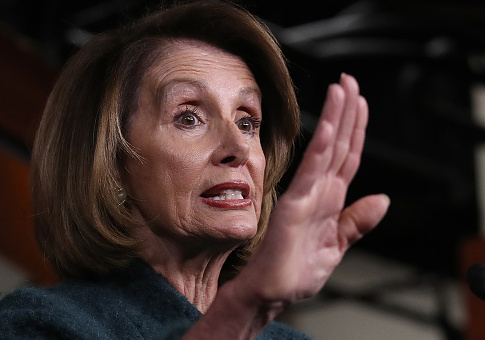Speaker Nancy Pelosi (D., Calif.) tells the New York Times in a new interview she is worried that unless President Donald Trump is overwhelmingly defeated in 2020, he will contest the results of the election:
"We have to inoculate against that, we have to be prepared for that," Ms. Pelosi said during an interview at the Capitol on Wednesday as she discussed her concern that Mr. Trump would not give up power voluntarily if he lost re-election by a slim margin next year.
One can just imagine reporter Glenn Thrush nodding solemnly at Pelosi, brows furrowed about this potential crisis that could delegitimize President-elect Oprah Winfrey and thrust our fragile democracy into further tumult.
It's also about as galling a line as you could hear from the leader of the Democrats in 2019. Pelosi's party has made casting doubt on election results part of the political mainstream.
The last two Republican presidents, Trump and George W. Bush, were elected to their first terms by winning the Electoral College and not the popular vote. Democrats have not taken that well.
Al Gore conceded to Bush on Election Night in 2000, then withdrew his concession, then took the country on a five-week legal battle in Florida where terms like "hanging chad" and "butterfly ballot" became part of popular lore. Their fight went to the Supreme Court before Bush's 537-vote victory was upheld and he assumed the presidency.
Democrats still complain the Supreme Court elected Bush. Then-Democratic National Committee chair Debbie Wasserman Schultz (D., Fla.) sniffed in 2016 that Gore won Florida in 2000, and her MSNBC interviewer didn't push back that he, well, didn't. If Gore had won the presidency in 2000, he would have become the president.
We all know the 2016 election didn't end on November 8 of that year. The response to Trump's victory has been for Democrats to call for an elimination of the Electoral College, plus two years of investigations overblowing the impact of Russian interference to effectively cast doubt on the stunning result.
Democrats aren't just looking to the past when it comes to doubting elections. Hillary Clinton recently sneered that even 2020 candidates who run the "best campaign" could have the race "stolen" from them, too.
As a fierce, nasty woman told us in 2016, that's troubling rhetoric from a leading political figure.
Donald Trump refused to say that he’d respect the results of this election.
That’s a direct threat to our democracy.
— Hillary Clinton (@HillaryClinton) October 24, 2016
Stacey Abrams agreed with Clinton at the time.
Trump's refusal to concede the election if he loses proves he is a petty man uninterested in our national stability https://t.co/V1alhxLKmn
— Stacey Abrams (@staceyabrams) October 20, 2016
Speaking of, Abrams has repeatedly said "I won" the 2018 Georgia governor's race despite losing by nearly 55,000 votes and claimed Republican Brian Kemp's victory was "stolen."
Has Abrams been relegated to the fringe for throwing out wild accusations of massive voter suppression, in a state where midterm turnout surged 14 points between 2014 and 2018, she won more votes than any Democrat in Georgia history, and Kemp enforced purging laws passed by Georgia Democrats in the 1990s?
The answer is no: She gave the official party response to Trump's State of the Union address, and her "stolen" charges are shared by Clinton and 2020 Democratic candidates Kamala Harris, Elizabeth Warren, and Cory Booker.
.@KamalaHarris in her keynote speech at the NAACP convention: "Let's say this loud and clear: without voter suppression, Stacey Abrams would be the governor of Georgia, Andrew Gillum is the governor of Florida."
— Sahil Kapur (@sahilkapur) May 6, 2019
I asked @ewarren if she thinks the election was stolen from @staceyabrams, who she supported. "I think that's what the evidence seems to suggest."
— David Rutz (@DavidRutz) February 16, 2019
Cory Booker says the Georgia election is being 'stolen' from Stacey Abrams https://t.co/kf5uAVe8zL by @hunterw pic.twitter.com/YCZWpfqKxN
— Yahoo News (@YahooNews) November 14, 2018
This isn't entirely new.
In 1984, a 28-year-old Republican named Richard McIntyre appeared to have knocked off incumbent Democratic Rep. Frank McCloskey in Indiana's 8th District by 34 votes. House Democrats, then in the middle of 40 years of continuous majority rule, refused to seat McIntyre, appointed a task force consisting of two Democrats and one Republican to investigate, and eventually drew the process out until April when McCloskey was declared the winner by four ballots.
MSNBC's Steve Kornacki wrote in The Red and the Blue that it was a key moment in the ascendance of future Speaker Newt Gingrich and the tribalism that arose in the 1990s. The Democrats are going to play dirty? We'll have to, too.
Politically, this is puzzling behavior. Polling shows the American people don't care to have their judgment questioned by sore losers. Abrams and Clinton have both seen their personal popularity decline during their extended media tours that alternate between winking and outright conspiracy theorizing about their defeats.
Would Trump follow Abrams's example and refuse to concede if he gets beaten in 2020? I wouldn't put it past him; he's spent the last several years suggesting he would have won the popular vote if not for voter fraud. But let's cross that bridge when we come to it.
